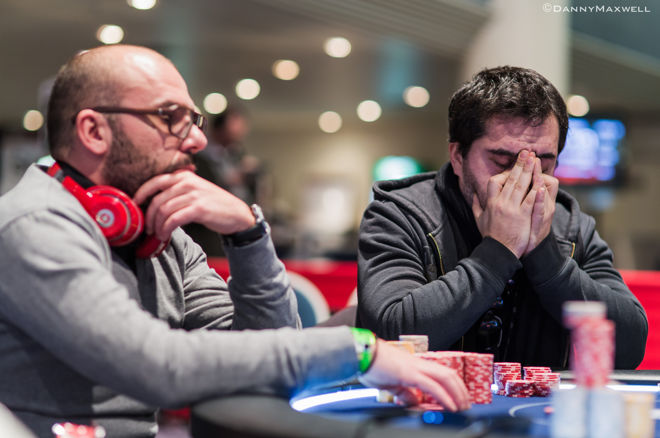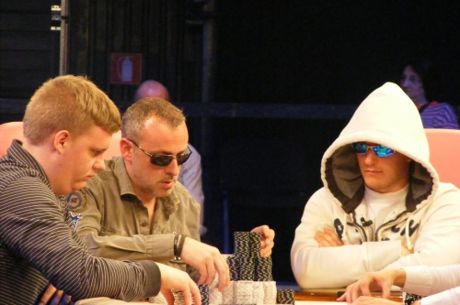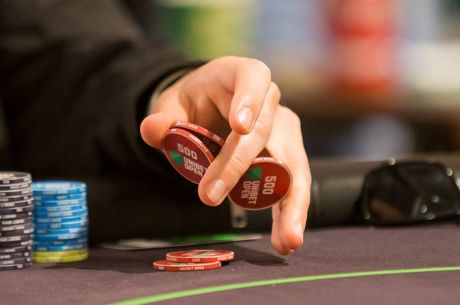Why Bluffing is Hard and Other Poker Insights from Biology

I wrote about Robert Trivers here earlier in the summer when I was first introduced to his scientific work through a magazine article. As I mentioned then, he's an evolutionary biologist who has spent most of his career researching the role that deception plays in every form of life, from viruses to walruses.
I ended up buying the book he wrote summarizing what he and other researchers have learned about the subject, titled The Folly of Fools: The Logic of Deceit and Self-Deception in Human Life.
I think it's impossible for a poker player to read about deception and not think about how it relates to poker. Accordingly, I wrote another article last month about two different marine animals described in Trivers's book, one with a simple deception strategy and one with a complex deception strategy, and how these resemble unskilled and skilled poker players, respectively.
I've now finished reading the book. It took me quite a while, because it's heavy �� in more ways than one. But I found it fascinating, and full of useful insights, many of which have an obvious connection to poker. I think six more of those insights are worth expounding about here. I'll do three of them today, then one more article with the others later.
1. Understanding How Bluffing Increases Your Cognitive Load
"Lying can be cognitively demanding," writes Trivers, highlighting a topic with which poker players who understand the importance of deception are familiar.
"You must suppress the truth and construct a falsehood that is plausible on its face and does not contradict anything known by the listener, nor likely to be known," he continues. "You must tell it in a convincing way and you must remember the story. This usually takes time and concentration, both of which may give off secondary cues and reduce performance on simultaneous tasks��. Absent well-rehearsed lies, people who are lying have to think too hard."
Trivers then follows with a story of someone arriving on his property in Jamaica on a motorcycle with an intention (he thinks) of trying to extort money from him or possibly rob him.
"What was his name, I wanted to know. 'Steve,' he said. 'And what is your last name?' Pause. 'It is not supposed to take a long time to remember your own last name.' Quick as you can say 'Jones,' he said, 'Jones.' So it was 'Steve Jones' �� not an entirely unlikely pair of names in Jamaica �� but less believable on its face than his actual name, which turned out to be Omar Clarke. The point is that cognitive load gave him away at once."
I don't even have to make an analogy here. This observation is directly applicable at the poker table. Specifically, bluffing imposes a greater cognitive load than does playing a hand in a straightforward manner.
If you play ABC poker, everything you do makes sense to an opponent, for the same reason that it makes sense to you. But if you're bluffing, you have to craft a story street by street, one that is consistent and believable. You also have to be evaluating your opponent to see whether he is believing your tall tale. It's hard mental work.
Nearly all poker players feel this instinctively, even if they wouldn't choose to describe it by a fancy phrase like "cognitive load." The important result of that fact is that players will bluff less when they are busy with other things.
All else being equal, an opponent is much less likely to be bluffing if he is playing the hand while eating, intently watching sports, getting a nice massage, or playing around on his phone. Somebody who chooses to contest a pot under those circumstances usually has a strong starting hand, else he would just muck it and go on with whatever he's doing.
Similarly, once he's into the hand and it's not going well, it's a lot easier to dump it than to figure out whether and how to bluff his way to winning. He knows, at some level, that it's extremely difficult to bluff convincingly with his attention divided. Cutting his losses will seem like a more attractive option if he has other things he wants to be doing.
The lesson, then, is that somebody who keeps playing while he simultaneously doing something else has a much higher ratio of value betting to bluffing than if he were not so engaged.
2. Using Randomness as a Strategy
Trivers describes a evolutionary war between passion flower vines and Heliconius butterflies. The butterflies like to lay their eggs on the leaves of the plants, so that the larvae, when hatched, can eat the leaves. This injures the plants. They have yellow spots on their leaves that sort of look like butterfly eggs, except that they occur in symmetrical patterns, while butterfly eggs are laid randomly.
In response, some species of this plant group have evolved a defense �� their spots develop in random, non-symmetric patterns that better resemble deposited butterfly eggs. This discourages butterflies from laying, because they think another butterfly has beaten them to this particular plant. It's better for them to find an uncontested place to lay eggs so that their young don't have to compete for the food source.
As Trivers notes, "We use patterns to detect deception, and randomness is the absence of pattern." When those plant spots are in their primitive form, they are non-random and therefore easy to identify as not being butterfly eggs. But when they are random, it's difficult for the butterfly to see them for what they really are.
Randomness is a useful strategy in poker, too. Of course, pure randomness in every decision will merely be chaotic, not thoughtful, and certainly not long-term profitable. But mixing some randomness in with your straightforward play makes it harder for opponents to deduce your hole cards from your betting.
You've probably read about using a wristwatch as a pseudo-randomness generator. Suppose in a certain river situation you think you should bluff-bet about half the time, check the other half. You glance at your watch, and if the second hand is between 12 and 6, bluff; if it's between 6 and 12, check.
Few people wear wristwatches these days, but you can do the same thing by lots of other means. For example, quickly add the ranks of the cards on the board, and bet if the sum is even, check if it's odd. Or use the last digit showing in the time on your cell phone the same way.
3. Dealing with Being a Parasite
You know what a parasite is �� an organism that lives on or in another and depends on that "host" for its sustenance.
Trivers shares the "sobering thought that more than half of all species on earth are parasitic on the other half �� and this is a gross underestimate of the relative frequency of the two, since species of parasites are usually much smaller and harder to detect than are their host species."
How this relates to poker is more a philosophical matter than a strategic one. Many, many people who have played poker for a living have faced the problem of feeling like they're not contributing to society, not making the world a better place. You don't generate wealth, but merely take it from others. You are, in a very real sense, a parasite, like a tapeworm taking its nourishment from the food eaten by its host.
To be sure, you're doing so (presumably) in an entirely legal, above-board manner. It is also true that the people you take money from are trying to take yours from you. Nevertheless, it's hard to feel as good about your life as you might if you were a teacher, an inventor, a nurse, or a social worker.
This angst weighs on people differently. Some aren't bothered at all. Others get so tormented by it that they eventually leave the game for other pursuits. Liv Boeree, Igor Kurganov, and Philipp Gruissem founded a charity, "Raising for Effective Giving" (or the REG Charity) so that, as Boeree said, "the money won in poker can do so much more than just benefiting ourselves."
Barry Greenstein, in his book Ace on the River, addresses this issue directly.
"I have felt a need to justify my role in society," writes Greenstein. "I like to think of myself as a modern-day Robin Hood. By using my wits, I take money from rich people for the benefit of others. I provide comfort and security for my family and I also help the needy. Giving to charity is my way of doing something constructive with this inherently nonproductive profession."
Only you can decide how to resolve this issue, but it is one that you will need to come to grips with in some way, if you're going to be anything other than a recreational, small-stakes player.
That's all for now. Three more insights from Robert Trivers next time.
Robert Woolley lives in Asheville, NC. He spent several years in Las Vegas and chronicled his life in poker on the "Poker Grump" blog.
Be sure to complete your PokerNews experience by checking out an overview of our mobile and tablet apps here. Stay on top of the poker world from your phone with our mobile iOS and Android app, or fire up our iPad app on your tablet. You can also update your own chip counts from poker tournaments around ?the world with MyStack on both Android and iOS.









